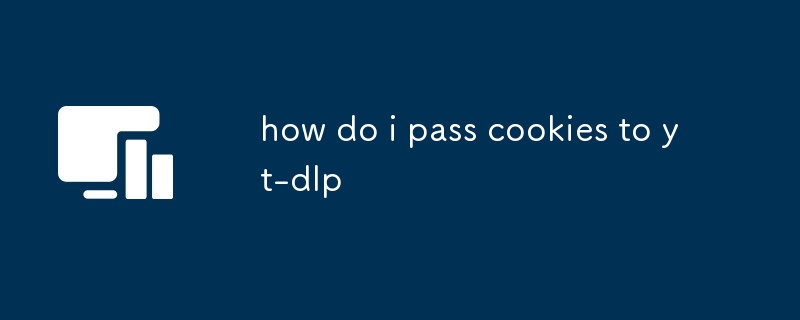how do i pass cookies to yt-dlp
This article explains how to pass cookies to yt-dlp, a command-line utility for downloading videos from YouTube and other video-sharing websites. Cookies are small text files that store user information, such as login credentials and preferences. Pas

How can I pass cookies to yt-dlp?
To pass cookies to yt-dlp, you can use the --cookies option. This option takes a file path as its argument, and the file should contain the cookies in the following format:--cookies option. This option takes a file path as its argument, and the file should contain the cookies in the following format:
<code><domain>\t<cookie name>\t<expiration date>\t<value></code>
For example, to pass the SID and SSID cookies from the youtube.com domain, you would create a file named cookies.txt with the following contents:
<code>youtube.com\tSID\t1640000000\tAQAS... youtube.com\tSSID\t1640000000\tAQAS...</code>
Once you have created the cookies file, you can pass it to yt-dlp using the --cookies option. For example, the following command would download the video with the URL https://www.example.com/video.mp4 and pass the cookies from the cookies.txt file:
<code>yt-dlp --cookies cookies.txt https://www.example.com/video.mp4</code>
What is the process for passing cookies to yt-dlp?
The process for passing cookies to yt-dlp is as follows:
- Create a file containing the cookies in the following format:
<code><domain>\t<cookie name>\t<expiration date>\t<value></code>
- Save the file with a
.txtextension, such ascookies.txt. - Pass the cookies file to yt-dlp using the
--cookiesoption. - Run yt-dlp to download the video or audio file.
How do I pass cookies to yt-dlp?
To pass cookies to yt-dlp, use the --cookies option followed by the path to the cookies file. The cookies file should contain the cookies in the following format:
<code><domain>\t<cookie name>\t<expiration date>\t<value></code>
For example, to pass the SID and SSID cookies from the youtube.com domain to yt-dlp, create a file named cookies.txt
<code>youtube.com\tSID\t1640000000\tAQAS... youtube.com\tSSID\t1640000000\tAQAS...</code>
SID and SSID cookies from the youtube.com domain, you would create a file named cookies.txt with the following contents:
<code>yt-dlp --cookies cookies.txt https://www.youtube.com/watch?v=dQw4w9WgXcQ</code>
--cookies option. For example, the following command would download the video with the URL https://www.example.com/video.mp4 and pass the cookies from the cookies.txt file:🎜rrreee🎜What is the process for passing cookies to yt-dlp?🎜🎜The process for passing cookies to yt-dlp is as follows:🎜- Create a file containing the cookies in the following format:
- Save the file with a
.txtextension, such ascookies.txt. - Pass the cookies file to yt-dlp using the
--cookiesoption. - Run yt-dlp to download the video or audio file.
--cookies option followed by the path to the cookies file. The cookies file should contain the cookies in the following format:🎜rrreee🎜For example, to pass the SID and SSID cookies from the youtube.com domain to yt-dlp, create a file named cookies.txt with the following contents:🎜rrreee🎜Then, run yt-dlp with the following command:🎜rrreeeThe above is the detailed content of how do i pass cookies to yt-dlp. For more information, please follow other related articles on the PHP Chinese website!

Hot AI Tools

Undresser.AI Undress
AI-powered app for creating realistic nude photos

AI Clothes Remover
Online AI tool for removing clothes from photos.

Undress AI Tool
Undress images for free

Clothoff.io
AI clothes remover

Video Face Swap
Swap faces in any video effortlessly with our completely free AI face swap tool!

Hot Article

Hot Tools

Notepad++7.3.1
Easy-to-use and free code editor

SublimeText3 Chinese version
Chinese version, very easy to use

Zend Studio 13.0.1
Powerful PHP integrated development environment

Dreamweaver CS6
Visual web development tools

SublimeText3 Mac version
God-level code editing software (SublimeText3)

Hot Topics
 1664
1664
 14
14
 1423
1423
 52
52
 1317
1317
 25
25
 1268
1268
 29
29
 1246
1246
 24
24


